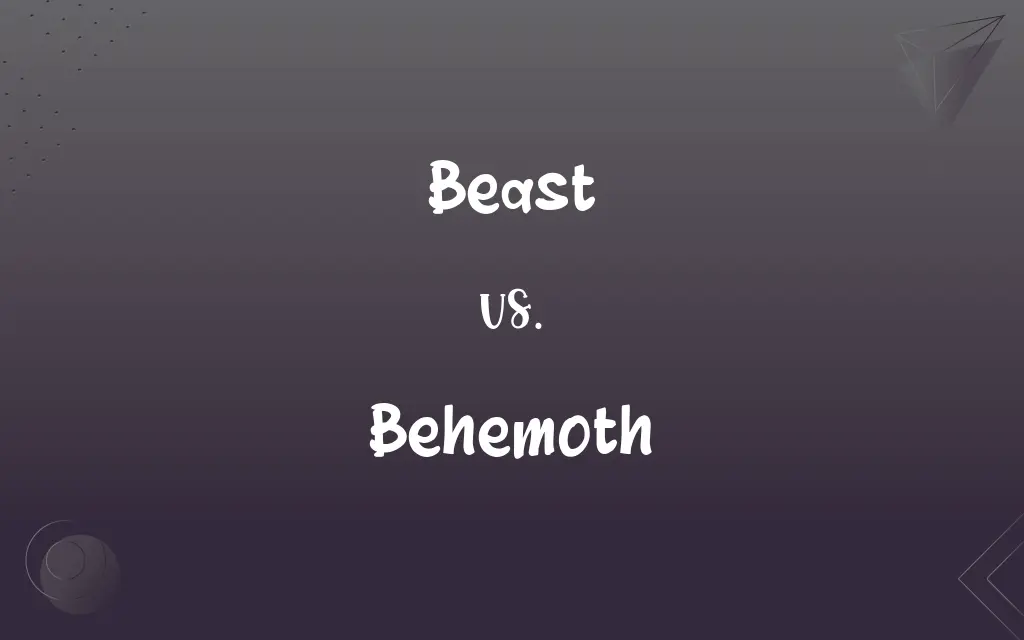Beast vs. Behemoth: What's the Difference?
Edited by Harlon Moss || By Janet White || Updated on November 28, 2023
"Beast" generally refers to an animal, especially a large or wild one; "behemoth" signifies something of enormous size or power, often used metaphorically.

Key Differences
Beast commonly denotes any animal, especially those that are large, wild, or ferocious. Behemoth, however, typically refers to something of immense size and power, often more than just an animal.
The term beast can be used for a wide range of animals, from domesticated to wild creatures. In contrast, behemoth is mostly used to describe exceptionally large or gigantic entities, whether animals, machines, or organizations.
In literature, 'beast' can symbolize savagery or uncontrolled nature. 'Behemoth', on the other hand, often symbolizes overwhelming power or dominance.
Beast can also be used figuratively to describe a brutal or uncivilized person. Behemoth, in figurative speech, refers to anything extremely large or powerful in its field.
Beasts are common in myths and legends, while behemoths are often used to emphasize the extraordinary or awe-inspiring, surpassing typical boundaries.
ADVERTISEMENT
Comparison Chart
Basic Definition
An animal, often large or wild
Something enormous in size or power
Usage Scope
Wide range of animals
Exceptionally large or powerful entities
Symbolic Meaning
Savagery, wild nature
Overwhelming power, dominance
Figurative Usage
Can describe a brutal person
Refers to large, powerful organizations or things
Mythological Context
Common in various myths and legends
Used to describe extraordinary entities
ADVERTISEMENT
Beast and Behemoth Definitions
Beast
Used to describe something difficult or unpleasant.
The final exam was a real beast.
Behemoth
Anything extraordinarily large and powerful.
The dam was a behemoth of engineering.
Beast
Any animal, especially a large or wild one.
The forest was full of unknown beasts.
Behemoth
Used metaphorically to describe immense objects or structures.
The stadium stood as a behemoth among buildings.
Beast
A brutal or savage person.
He acted like a beast in his anger.
Behemoth
Something of enormous size or power.
The new airplane was a behemoth of the skies.
Beast
Something characterized by animal-like traits.
The car was a beast in terms of power.
Behemoth
A huge or monstrous creature.
Legends speak of a behemoth in the deep sea.
Beast
Mythical or legendary creature.
Tales of beasts like dragons fascinated him.
Behemoth
A gigantic or powerful organization.
The company was a behemoth in the industry.
Beast
An animal other than a human, especially a large four-footed mammal.
Behemoth
Something enormous in size or power.
Beast
Animal nature as opposed to intellect or spirit
An insult that brought out the beast in him.
Behemoth
Often Behemoth A huge animal, possibly the hippopotamus, described in the Bible.
Behemoth
(Bible) A great and mighty beast God shows Job in Job 40:15–24.
Behemoth
(by extension) Any great and mighty monster.
Behemoth
(figurative) Something which has the qualities of great power and might, and monstrous proportions.
Behemoth
An animal, probably the hippopotamus, described in Job xl. 15-24.
Behemoth
Something of large size or great power.
Behemoth
Someone or something that is abnormally large and powerful
Behemoth
A person of exceptional importance and reputation
FAQs
Do "beasts" always imply danger?
Not necessarily, but it often connotes wildness.
Is the term "beast" used in sports?
Yes, to describe a strong or formidable player.
Are "beasts" part of folklore?
Yes, many cultures have folklore involving beasts.
Is "behemoth" a biblical term?
Yes, it originates from the Bible, describing a colossal creature.
Can "beast" be a term of endearment?
Sometimes, in a playful or admiring context.
Can "behemoth" refer to a company?
Yes, it's used to describe very large, powerful companies.
Does "behemoth" relate to nature or technology?
It can relate to both, depending on the context.
Can "behemoth" describe a vehicle?
Yes, especially for very large or powerful vehicles.
Can "beast" refer to a mythical creature?
Yes, it's often used in myths and legends.
Does "beast" imply a lack of intelligence?
Not necessarily; it focuses more on the wild or primal aspect.
Is "behemoth" used in military contexts?
Yes, for describing large and powerful military equipment.
Can "beast" refer to a challenging task?
Yes, it's used figuratively to describe difficult tasks.
How is "behemoth" used in literature?
Often to represent something vast and overwhelming.
Does "behemoth" always imply something positive?
No, it can be neutral or imposing, depending on the context.
Can "behemoth" be used to describe a building?
Yes, for very large or imposing buildings.
Is "beast" used in children's stories?
Yes, often in fairy tales and fables.
Does "beast" always have a negative connotation?
Not always; it depends on the context.
Is "behemoth" a common term in everyday language?
It's less common and more often used in specific or dramatic contexts.
How is "behemoth" perceived in popular culture?
Often as a symbol of immense size, strength, or power.
Can "beast" denote strength or power?
Yes, especially in a metaphorical sense.
About Author
Written by
Janet WhiteJanet White has been an esteemed writer and blogger for Difference Wiki. Holding a Master's degree in Science and Medical Journalism from the prestigious Boston University, she has consistently demonstrated her expertise and passion for her field. When she's not immersed in her work, Janet relishes her time exercising, delving into a good book, and cherishing moments with friends and family.
Edited by
Harlon MossHarlon is a seasoned quality moderator and accomplished content writer for Difference Wiki. An alumnus of the prestigious University of California, he earned his degree in Computer Science. Leveraging his academic background, Harlon brings a meticulous and informed perspective to his work, ensuring content accuracy and excellence.































































